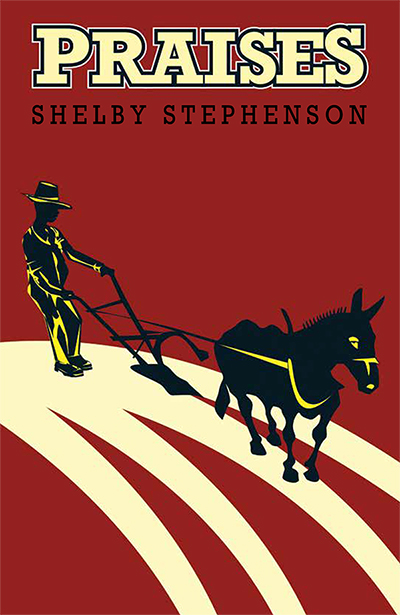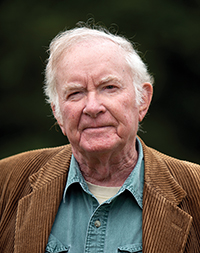Praises
poems by
Shelby Stephenson
ISBN: 978-1-59948-889-9, 110 pages, $16 (+ shipping)
Projected Release Date: November 16, 2021
An Advance Sale Discount on this title has expired. For those who prefer to pay by check, the price is $20/book (which includes shipping) and should be sent to: Main Street Rag, PO BOX 690100, Charlotte, NC 28227-7001.
Praises is part archive, part song, part reminiscence, part witness, and mostly praise (for the praiseworthy). Shelby Stephenson does not offer lyric effusion in a neutral space; he demonstrates that Emerson’s “the mind of the Past” is best encountered through the generous sensibility of a grounded poet. I wish every poet over the age of sixty would produce a book of this kind. This volume should be in every collection devoted to Southern studies. ~Ron Smith, Poet Laureate of Virginia (2014-2016) and author of Its Ghostly Workshop and The Humility of the Brutes
Shelby Stephenson is a poet for the ages. In Praises, he celebrates North Carolina through the years in a series of poems that capture the essence of the land and its people. Along the way, he pays tribute in verse to renowned writers past and present. Shelby is a North Carolina treasure. ~Charles Blackburn, Jr., author of Sweet Souls and Other Stories
Praises sings with the reminders of human fragility, lyrical tendencies, and celebration. Shelby Stephenson scatters and honors the voices of the makers of these stories like an undertaker stringing the small bones of birds across yonder fields and skies, lest they be remembered as honest, articulate, and human. This collection is a commemorative flag and a benediction for the burdens of freedom carried in the hearts of free and not so free Carolina sons and daughters. ~Jaki Shelton Green, North Carolina Poet Laureat
SHE ESCAPED SLAVERY AND WAS LATER FREED
for Harriet Jacobs
(February 11, 1813 − March 7, 1897)
To contemplate tip and top,
pit and sin, the outright wrong,
humane, not,
the magnolia at dusk a risen shout
the wind-swept tin,
always banging her ear,
I’ll break out
above these stairs,
go North; be slave no more –
dare to race the drivel
of incidents
of my child’s grave,
no life, except in dreaming
to be free − living
her memoir in marvelous
murmurs, avoiding shots;
the miraculous comes –
her heaven’s haven
spheres
Incidents in the Life of a Slave Girl.
SINGER
for Carl Sandburg
(January 6, 1878 – July 22, 1967)
Chicago! Connemara, Flat Rock, North Carolina.
As a boy I see mostly Carl Sandburg and his guitar.
My sister Rose gave me a Sandburg book for my birthday.
I won’t forget that, as she’s at Morningside in Raleigh.
She’s said my name once in two years.
My guess is a song might bring her out of
Dementia attending her rich diversity of songs,
Including “There’s a Hole in the Bottom of the Sea.”
I want to think I heard Sandburg sing once
On early TV: “Boll Weevil.” I know what
One is.
I know grass, too. There is a song
George Jones sings: “I’ll Be Over You When the Grass Grows Over me.”
Porter Wagoner sings “The Green, Green Grass of Home.”
Sandburg sings “I am the grass. Let me work.”
“Pile the bodies high at Austerlitz and Waterloo,
Shovel them under and let me work –
I am the grass; I cover all.”
“And pile them high at Gettysburg” –
“Pocahontas’ body, lovely as a poplar,
sweet as a red haw in November or a pawpaw
in May, did she wonder? Does she remember? . . .
in the dust . . . in the cool tombs.”
The earth is a reaping and remembering:
The body, our soul’s anchor,
Slips into its settling,
Comes back in song and memory,
Or in a baby’s breath
Exhaling remnants of sources
Unknown. Where is our longing?
Sandburg’s instinct tunes pain to joy,
The cat ever launching out in Nature’s splendor,
Fog, travel’s memory.
LISTEN
for Randall Jarrell
(May 6, 1914 – October 14, 1965)
Big Daddy, who was scared, he said: “I’ve been scared
Most of my life. You wouldn’t think so to look at me.
It gets so bad I cry myself to sleep – ”
~From “Say Good-bye to Big Daddy”
“It is pain”: Hand Rehabilitation Center, US 15-501.
Chapel Hill, Jarrell, pedestrian. Like yesterday:
Peter Taylor said, “Randall was something else.”
Listen: the message says Go your way: what
Alternative is there? The bird that smears the picture
Window flies, overstating times the veins in arms
Look like kisses on onion-skin, pain forming
Bandages needing arms to hold hands dangling
Words I cannot imagine will take my tongue
For good and let me forget the morrow forgiving today.
The enthusiast loves lights, honky-tonking,
Yellow buses, too, children’s love, the convertible
Mercedes sports car, talk, joy’s sorrow, pain.
THE WORLD LEADS US TO THE ARTS AND BACK
for Sam Ragan
(December 31, 1915 − May 11, 1996)
How glad I am that my school helped move your hand toward journalism and poetry and democracy with a little “d.” Cleveland High School: This land of ours is full of schools, schools both great and
small; when it comes to praising them, why my school beats them all. I’m proud you graduated from my Johnston County alma mater. I’m sorry your family lost the farm in Granville, around Berea, Shake Rag,
Stem. You came to Bailey’s Crossroads, lived near Ebenezer Church, among the Ogburns; your love of words showered acres, snuffling the burning crosses. Hope was your story, lyric, svelte. Poverty? You
wrote in “That Summer”: “A wild turkey flew out of the woods / And even if it was out of season /
He fed a family for two days. / And it was better than that mud turtle / That looked like mud and tasted
like mud.” I loved to walk into your office piled high with papers. You’d peer over them, rise, jingle some change in your pocket and say, “Well, what do you know?” “On a scale of one to five, Sam, about
minus two,” I’d say. Your vacations you took in your office, mostly. Sunday mornings? When I’d drive by, I’d see your Buick parked beside The Pilot.


 Shelby Stephenson served as Poet Laureate of North Carolina 2015-2018. Recent books: Possum (Bright Hill Press), winner of Brockman-Campbell Award; Elegies for Small Game (Press 53), winner of Roanoke-Chowan Award; Family Matters: Homage to July, the Slave Girl (Bellday Books), the Bellday Prize; Paul’s Hill: Homage to Whitman (Sir Walter Press); Our World (Press 53); Fiddledeedee (The Bunny and the Crocodile Press; reprinted by Press 53); Nin’s Poem (St. Andrews University Press); Slavery and Freedom on Paul’s Hill (Press 53); Shelby’s Lady: The Hog Poems (Fernwood Press). He lives at the homeplace on Paul’s Hill, where he was born.
Shelby Stephenson served as Poet Laureate of North Carolina 2015-2018. Recent books: Possum (Bright Hill Press), winner of Brockman-Campbell Award; Elegies for Small Game (Press 53), winner of Roanoke-Chowan Award; Family Matters: Homage to July, the Slave Girl (Bellday Books), the Bellday Prize; Paul’s Hill: Homage to Whitman (Sir Walter Press); Our World (Press 53); Fiddledeedee (The Bunny and the Crocodile Press; reprinted by Press 53); Nin’s Poem (St. Andrews University Press); Slavery and Freedom on Paul’s Hill (Press 53); Shelby’s Lady: The Hog Poems (Fernwood Press). He lives at the homeplace on Paul’s Hill, where he was born.